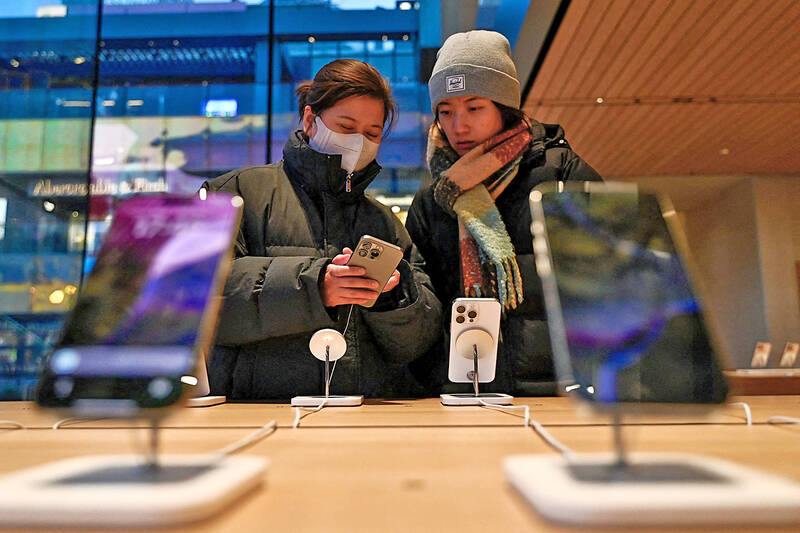Apple Inc was set to launch its latest budget iPhone model yesterday as it looks to grab a bigger share of the mid-range smartphone market and fend off competition from rivals such as Samsung Electronics Co and China’s Huawei Technologies Co (華為).
The fourth generation of the lower-cost model, so far known as iPhone SE, will take on popular Android smartphones at a time when consumer electronics makers are looking to add artificial intelligence (AI) tools into their devices.
The current generation of iPhone SE, released in 2022, is available at US$429 and the latest version is likely to be priced at a premium to the outgoing model. The iPhone 16, launched in September last year, starts at US$799 for the base variant.

Photo: Pedro Pardo, AFP
“If the SE 4 offers meaningful upgrades in design, performance, and AI features, it could reinvigorate its market appeal and strengthen Apple’s position across different price segments,” Counterpoint Research senior analyst Varun Mishra said.
Apple late last month forecast strong sales growth signaling that the company will recover from a dip in iPhone sales as it rolls out AI features in the coming months to more regions and languages.
However, analysts have been cautious about the sales boost such tools could provide, as Apple’s AI features are set to be rolled out in phases in some regions on its latest iPhone 16 line-up and the iPhone 15 Pro model.
The SE model’s sales as part of total revenue for iPhones has dropped from 10 percent from its introduction in 2016 to about 1 percent last year, according to Counterpoint Research.
This year’s update is expected to revamp its slab design, ditch the physical home button and introduce its FaceID feature, apart from camera and processor updates to support AI features, according to analysts and media reports.
The SE model would be the last among iPhones to adopt the USB Type-C port for charging, a departure from its proprietary Lightning connector.
Apple has already discontinued the current SE and iPhone 14 in the European Union as the products do not conform with local laws requiring USB Type-C charging standard. The latest SE model would let it return to the EU.

Anna Bhobho, a 31-year-old housewife from rural Zimbabwe, was once a silent observer in her home, excluded from financial and family decisionmaking in the deeply patriarchal society. Today, she is a driver of change in her village, thanks to an electric tricycle she owns. In many parts of rural sub-Saharan Africa, women have long been excluded from mainstream economic activities such as operating public transportation. However, three-wheelers powered by green energy are reversing that trend, offering financial opportunities and a newfound sense of importance. “My husband now looks up to me to take care of a large chunk of expenses,

SECTOR LEADER: TSMC can increase capacity by as much as 20 percent or more in the advanced node part of the foundry market by 2030, an analyst said Taiwan Semiconductor Manufacturing Co (TSMC, 台積電) is expected to lead its peers in the advanced 2-nanometer process technology, despite competition from Samsung Electronics Co and Intel Corp, TrendForce Corp analyst Joanne Chiao (喬安) said. TSMC’s sophisticated products and its large production scale are expected to allow the company to continue dominating the global 2-nanometer process market this year, Chiao said. The world’s largest contract chipmaker is scheduled to begin mass production of chips made on the 2-nanometer process in its Hsinchu fab in the second half of this year. It would also hold a ceremony on Monday next week to

TECH CLUSTER: The US company’s new office is in the Shalun Smart Green Energy Science City, a new AI industry base and cybersecurity hub in southern Taiwan US chip designer Advanced Micro Devices Inc (AMD) yesterday launched an office in Tainan’s Gueiren District (歸仁), marking a significant milestone in the development of southern Taiwan’s artificial intelligence (AI) industry, the Tainan City Government said in a statement. AMD Taiwan general manager Vincent Chern (陳民皓) presided over the opening ceremony for the company’s new office at the Shalun Smart Green Energy Science City (沙崙智慧綠能科學城), a new AI industry base and cybersecurity hub in southern Taiwan. Facilities in the new office include an information processing center, and a research and development (R&D) center, the Tainan Economic Development Bureau said. The Ministry

ADVERSARIES: The new list includes 11 entities in China and one in Taiwan, which is a local branch of Chinese cloud computing firm Inspur Group The US added dozens of entities to a trade blacklist on Tuesday, the US Department of Commerce said, in part to disrupt Beijing’s artificial intelligence (AI) and advanced computing capabilities. The action affects 80 entities from countries including China, the United Arab Emirates and Iran, with the commerce department citing their “activities contrary to US national security and foreign policy.” Those added to the “entity list” are restricted from obtaining US items and technologies without government authorization. “We will not allow adversaries to exploit American technology to bolster their own militaries and threaten American lives,” US Secretary of Commerce Howard Lutnick said. The entities